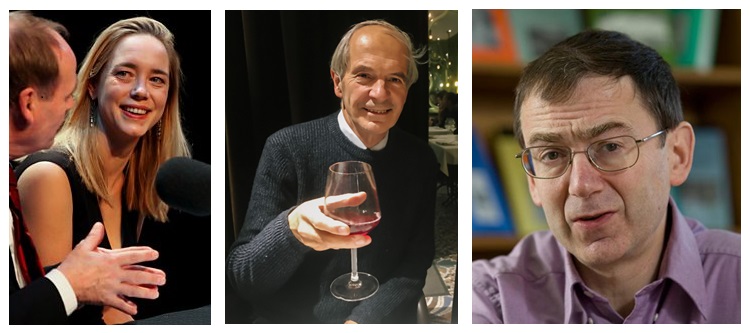St Andrews’ academics recognised in New Year Honours
Three outstanding academics from the University of St Andrews have been recognised in the King’s New Year Honours List 2023 for their services to education, mathematics, and literature (Friday 29 December).

St Andrews Regius Chair of Mathematics, Professor Kenneth Falconer FRSE, has been awarded a CBE for Services to Mathematics. Andrew Pettegree FBA, Professor of Modern History, has been awarded a CBE for Services to Literature, and Professor of Pure Mathematics, Colva Roney-Dougal, has been awarded an OBE for Services to Education and Mathematics, marking a double celebration for the University’s School of Mathematics.
Professor Kenneth Falconer FRSE is a world-leader in fractal geometry, an area of mathematics concerned with shapes that have detailed structure at arbitrarily small scales. He has been Professor of Pure Mathematics at the University of St Andrews for 30 years and, in 2017, was appointed Regius Chair of Mathematics by Her Majesty Queen Elizabeth II.
In 2020, Kenneth was awarded the London Mathematical Society Shephard Prize for his many original and profound results in fractal geometry, particularly the description, occurrence, geometrical properties and dimensional analysis of fractal sets and measures. He has written more than 130 papers and five books, including Fractal Geometry – Mathematical Foundations and Applicationswhich has become the seminal text in the field, and the accessible Fractals – A Very Short Introduction.
Kenneth’s broader contributions to mathematics include serving on the Council of the London Mathematical Society, as their Pubications Secretary and on several other committees, and organising semester-long research programmes on fractals in Cambridge and Stockholm.
Andrew Pettegree FBA is Professor of Modern History at St Andrews and Director of the Universal Short Title Catalogue, an online bibliography of all books published in the first age of print, 1450 to 1700.
He is the author of sixteen books in the fields of Reformation history and the history of communication, including Reformation and the Culture of Persuasion (Cambridge University Press, 2005), The Book in the Renaissance (Yale University Press, 2010), The Invention of News (Yale University Press, 2014), Brand Luther (Penguin, 2015), The Bookshop of the World: Making and Trading Books in the Dutch Golden Age (Yale University Press, 2019) and The Library: A Fragile History (Profile, 2021), co-authored with Arthur der Weduwen. The Book at War, a study of the relationship between books and warfare, was published in Autumn 2023.
Andrew has taught at St Andrews since 1986 and founded both the St Andrews Reformation Institute and the St Andrews Book History Research Group, both of which have highly successful publications series. He was elected a Fellow of the British Academy in 2021.
Colva Roney-Dougal is a Professor of Pure Mathematics, specialising in group theory and computational algebra. She is Director of the Centre for Interdisciplinary Research in Computational Algebra at St Andrews and, in 2021, became the first female Head of Pure Mathematics at the University.
She is also known for her popularisation of mathematics on BBC radio shows. Colva has appeared several times on In Our Time, where she covered a wide range of mathematics topics, from the much debated P versus NP, an unsolved problem in maths that asks if the answers to all problems can be found as easily as they can be checked, to the works of Carl Friedrich Gauss, often called the ‘Prince of Mathematicians’. As well as this, she has made several appearances on The Infinite Monkey Cage about the nature of infinity and numbers in the real world and Stephen Fry’s BBC Radio 4 programme, Fry’s English Delight.
Colva completed her PhD at the University of London in 2001. With John Bray and Derek Holt, Colva is the co-author of the much-cited book The Maximal Subgroups of the Low-Dimensional Finite Classical Groups (London Mathematical Society and Cambridge University Press, 2013). She also recently organised and delivered a six-month research semester at the Isaac Newton Institute in Cambridge.
Category Awards